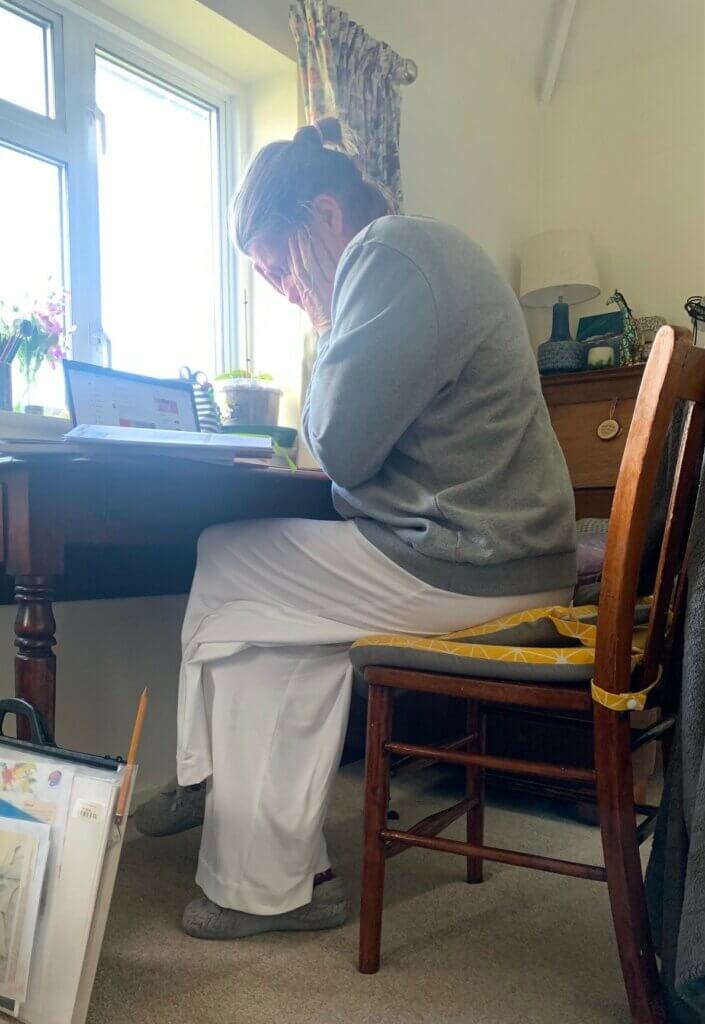Going through topical steroid withdrawal these past few years has taught me so much. It’s been very hard to go out into the world with a face that doesn’t look like anyone else. It’s shocking and dramatic and I don’t blame people for noticing but I do hate it when people feel they have a right to my story.
If you’ve ever said something and wished you could retract it, hit the rewind button and take it all back, here’s some advice that could help.

I’m talking to you and to anyone who has looked at a friend or a stranger and seen their pain and suffering and decided to share a suggestion or enquire about their medical condition. You might think you’re helping by sharing the amazing skin cream your cousin’s, mother’s dog used to heal their skin rash. You might think you’re being nice by saying, ‘but you look pretty’… but honestly, you’re probably not helping at all, and here’s why.
Eight reasons to stop asking people about disabilities
We know you care and we know you are trying to help… but stop, just for a minute and consider the following:
- Do you REALLY know the person? Because actually if you are a personal family member or close friend we really don’t mind you asking how we are, you guys probably DO know the daily struggle. Be prepared though for floods of tears because living with a chronic condition is really hard work. If you don’t really know someone , it’s none of your business. If they want to talk about it and start a conversation then that’s OK, but you have no right to ask. You might think I’m overreacting or being over sensitive… but keep reading…
- Does it look painful or challenging? If it looks sore, painful, uncomfortable or challenging then trust that it is and also know that we are also very aware of it. We have probably struggled to get ourselves out of the door and definitely don’t want to have our appearance commented on. We are just trying to get through the day and be treated like normal…
- Are you just interested? If you’re thinking, crikey I’ve not seen skin like that before… what on earth is going on? That’s just your natural human inquisitiveness kicking in. It’s perfectly normal and it’s what makes us such a fascinating race. We are interested in each other, we ask questions, we want to learn. But there is a time and place for learning. If you genuinely want to talk to someone who you can see has a visible difference, please try to just talk about normal stuff. The weather, compliment them on something they are wearing for instance. Anything but – what’s wrong with your skin? How did you get burnt? Have you been the doctor about that? We really just want to be normal, to blend in, to be ourselves and be respected by others. Our medical condition is none of your business.
- Is what you’re about to say kind, helpful or true? –This is something my Nana taught me when I was being particularly vile to my incredibly annoying (at the time – I adore, admire and absolutely cherish her now) little sister. Because if it’s not any of the three things listed above, keep your mouth firmly shut. Just count for a few seconds and you’ll probably realise it’s not wise to comment.
- Is it just sympathy? If it’s sympathy, it can come over as patronising and often unhelpful. For instance, if you feel sympathy for someone’s medical condition… never ever say anything like the following… “Oh poor you, I could never live like that.” Or “ I could never go out looking like that.” Both statements that have been said to me over and over again. Consider how that makes a person feel. What can they possibly respond? Are they supposed to feel grateful and thank you for your pity? All it does it pours shame onto them when they probably already feel some shame or embarrassment. They might be strong enough not to take that the wrong way but many people could be crushed or angered by such statements. We are just getting on with our lives as best we can, we don’t have any other choice.
- Are you just tying to be nice? – this is really hard to explain, but as TSW has affected my face, stripped the collagen, caused inflammation and swelling and deep crevices and wrinkles, I find it hard to see my face and love myself. I know that’s wrong and I’m working on it. But if I or someone shares that they’re struggling a little with their skin, you saying ‘but it looks fine’ doesn’t help. It might seem like a nice thing to say but it just feels dismissive. It isn’t fine, it’s sore and painful and consumes a huge amount of our lives coping. Consequently we bury our true feelings and don’t feel we can continue to be struggling with this thing that just never seems to get better. So we won’t talk to you about how we really feel again. Particularly when the person says, but you look fine, usually has skin you would die for!
- Are you trying to help? NEVER offer us suggestions for our skin – Everyone with a chronic skin condition will have been offered every helpful suggestion under the sun and many from those trying to profit from our skin condition. We don’t want to know, have already tuned you out and will not be taking your advice. Trust me when I say, we have tried EVERYTHING we can afford to try and found what helps. Most of what you’re suggesting will probably make us worse and we do not want your advice!
- Are you just worried about us? – I get it, you might be really concerned about a person’s health and wellbeing. You can offer help without being judgemental. Ask what you can do for someone. Do they need anything? Can you do some task or collect food or a prescription? Don’t tell us to stop scratching, eat this or that food, or go the doctor for advice. We’ve been there and done that. Just being there for someone and checking in is far more helpful.
Finally, if it’s empathy then you’re half way to finding a kind way to engage with someone. If you can stop for a second and really imagine yourself in their shoes, living what they live, you will realise that all they really need is your kindness and respect.
How to respond kindly to someone in pain
Just say Hi, how are you? Can I get you a drink? I love that scarf! Find some safe common ground to get chatting and you’ll be doing them the world of good compared to any of the above problem flag areas.
I’ve wanted to write about this for a while now and find it hard to get the right tone. We know you care, we understand you want to help but honestly, you’re not helping. Don’t say it, keep it to yourself, because we have tried everything, we are struggling and we do not want advice, just kindness. If we wanted advice we might ask for it but if we don’t? Just get us tea and cake.
I’d love to hear your thoughts. Are we just being over sensitive snow flakes who need to man up?
Imagine getting asked every day, why? How? When? What?
If you think so, then perhaps imagine if people referred to your appearance on a daily basis. People don’t mean to be unkind but the sheer volume of passive judgement is astounding. It happens across many conditions:
- Friends who use wheelchairs being asked why they can’t walk
- People carrying a bit of extra weight are constantly judged
- Racism is still a very real problem
- Homophobia is less of a problem but it’s still out there
- Cyber bullying and online trolling
Can we all just stop judging and let everyone be themselves? Just accept everyone as they are, if they’re not hurting anyone just them be themselves and you need to look inside and challenge your internal thoughts and judgements.
WE all need to stop judging everyone by their appearance
I think it’s actually a real problem. People just don’t think before they speak, a problem made worse when a keyboard is involved.
Just all stop it will you! Think before you speak or comment, because one day it might you on the other end of the judgement.
You may also be interested in reading:
- Responding to difficult comments
- Just F*ck off! – a rant about people commenting on my skin
- How EMT can help you destress
- How to respond when people comment on your skin – a brilliant blog by Lexi who has Rosacea












What a great post Ruth! And so needed. And thank you for adding the ‘how to do it well’ as well as the ‘what not to do’s.
As with comments on race and gender issues – so few people REALLY think about the implications of what they are going to say before saying it. As you say, most of the peple you are referring to are only trying to be ‘nice’ – but that simply isn’t good enough.
I’ll flag your post from my blog and hopefully direct a few more readers to you.
Thanks Michelle, yes it’s taught me so much, having such a deluge of nice well meaning comments directed at my own appearance has really made me think about how I engage with others and it’s certainly taught me a lot. I am certainly guilty of doing loads of those faux pas before TSW. Always a silver lining! If in doubt, don’t say it! LOL Although I am a great believer also in ‘there is no such thing a stupid question’… it’s just important to navigate when it’s OK to ask and how to ask it whether actually you should mind your own beeswax emollient! LOL
Absolutely the truth Ruth!
It’s taken me years of nice and polite and always explaining to finally realise, when I looked so peculiar it was EVERYONE’S FIRST question to me, that it’s exhausting and wearing and devastating. There are so many better ways to start a conversation. Listening to the We can do hard things podcast this week, they explained it like – Don’t ask the first thing – eg. if someone has very red hair, they know this and likely get so many comments on it. So don’t mention it. Don’t comment on our appearance at all. Just be creative and kind x
Just give us tea and cake! Spot on. I’d also like a hug
Oh yes… hugs always welcome. How could I miss out hugs? Not everyone likes those so always ask permission before hugging. But hugs, particularly bear hugs always welcome. Great call xxx ooo xxx OOOOO